The nuclear weapon against acne, also known as Accutane, might be the most effective solution for this condition, but it doesn’t come without its side effects.
Besides dry, irritated, sensitive, and peeling skin, Accutane can also affect your day-to-day life in many ways, including the decisions you make regarding the most mundane things you never thought twice about before starting the medication.
And as you scour the internet for information on whether you should drink alcohol, eat certain foods, or take certain supplements while on Accutane, it’s easy to become overwhelmed by all the conflicting advice and horror stories told by those who have sadly experienced some of the side effects you’re hoping to avoid.
Now, Accutane is no joke, and while I can definitely see where many people are coming from, it also doesn’t mean that you should stop living your life while taking the medication.
However, it does mean that you should be more careful and responsible about certain things.
Therefore, to help you out, I’ve rounded up a list of ten things you should avoid while taking Accutane.
And while it’s always important to monitor your physical and mental health while on the medication and take notes on any changes or potential side effects, avoiding the following can help make your experience a safer and more comfortable one:
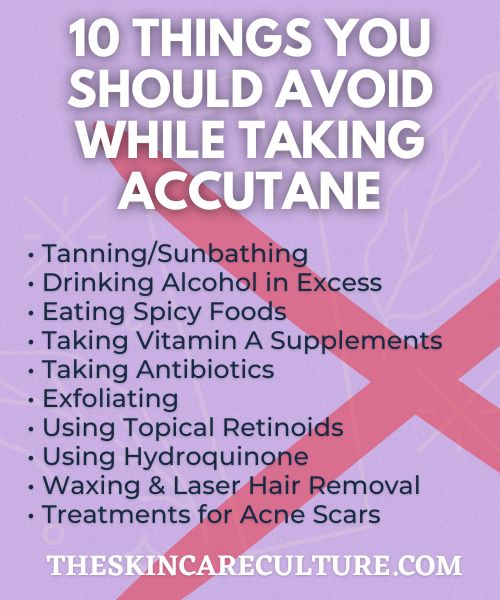
Tanning/Sunbathing
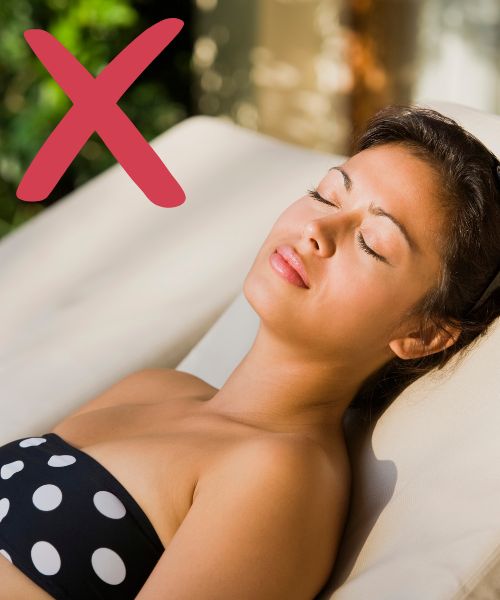
Tanning or sunbathing during your Accutane treatment is absolutely off-limits.
This is because exposure to the sun’s ultraviolet (UV) rays could cause serious and permanent skin discoloration, in addition to an increased risk of burning and developing skin cancer.
UV rays can also make the common side effects experienced while on Accutane, such as redness, dryness, and itching, more severe.
For all these reasons, it is essential to wear sunscreen each day (even when it’s cloudy!) and limit exposure to the sun during Accutane treatment.
If you are going to be outside for an extended period, make sure to cover up with sunscreen, and protective accessories like wide-brimmed hats, gloves, clothing, and sunglasses, as Accutane can make your eyes dry and sensitive to the sun.
Additionally, artificial tanning, such as tanning beds, should also be avoided during Accutane treatment as they can lead to skin irritation, damage, and even cancer.
Drinking Alcohol in Excess
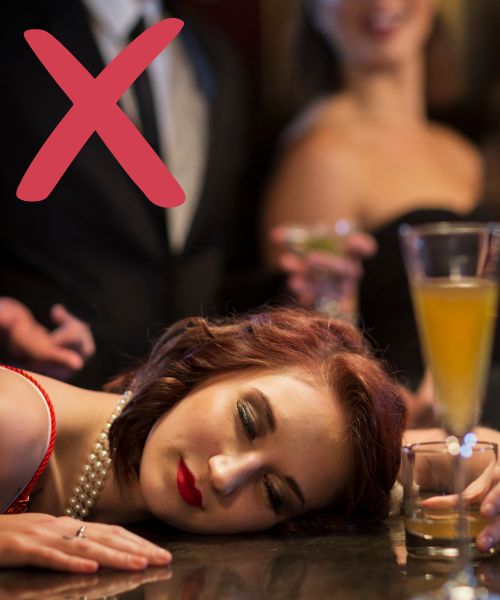
Accutane and alcohol are not a great combination, particularly if you’re a heavy or binge drinker. Combining these two substances can lead to some unpleasant and severe side effects.
Accutane is metabolized by the liver, so drinking alcohol while on the medication can increase your risk of liver damage and lead to stomach problems, including nausea and vomiting.
Furthermore, using Accutane while drinking alcohol can increase your risk of experiencing side effects such as even more severe headaches and dry skin due to alcohol being a diuretic that can cause the moisture in your skin to evaporate.
Additionally, fatigue is yet another potential side effect of mixing alcohol and Accutane, as both substances can cause an increase in the neurotransmitter gamma-Aminobutyric acid (GABA), causing the body to slow down and become lethargic.
Lastly, Accutane has been associated with elevations in serum triglycerides and cholesterol alongside decreases in HDL cholesterol (or the good cholesterol.)
Therefore, if you’re already on a cholesterol-lowering regimen while drinking alcohol and taking Accutane, there is an increased risk of experiencing side effects from both substances.
Eating Spicy Foods

This one is definitely tricky, as some people may have a higher tolerance for spicy food than others.
However, eating spicy food while on Accutane can cause your skin to react in a more severe manner than usual due to the increased blood flow stimulated by consuming certain components like capsaicin present in spicy foods.
This can lead to irritation and discomfort on your skin and worsen existing skin problems caused by Accutane, such as redness, flaking, and peeling.
Additionally, since Accutane dries out the skin and makes it extremely sensitive, especially the soft skin on your lips, it’s definitely possible that you will experience burning in this area from coming into contact with spicy food.
In conclusion, it’s best to avoid spicy meals while on Accutane to reduce potential discomforts and prevent further worsening of existing skin problems.
Taking Vitamin A Supplements
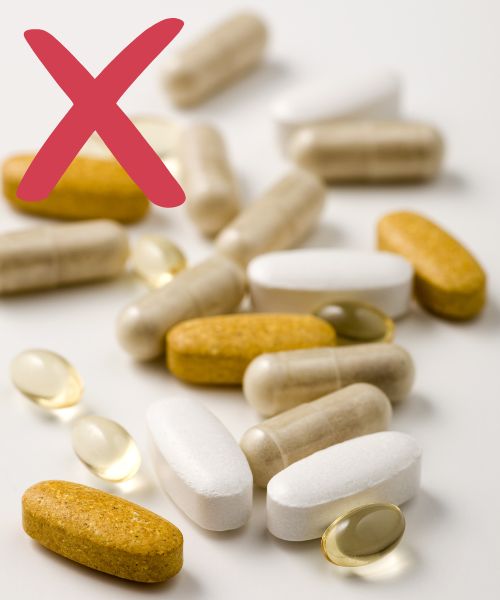
Taking supplements while on Accutane is generally acceptable and frequently recommended by doctors; however, the only supplement you should avoid is vitamin A.
Vitamin A is a fat-soluble nutrient that can build up in the body and potentially lead to toxicity if too much is taken.
And since Accutane is already the nuclear form of vitamin A, taking vitamin A supplements while on the medication can lead to an overdose of this nutrient and be extremely dangerous.
The most common symptoms of vitamin A toxicity include headache, nausea, vomiting, dry skin and eyes, hair loss, and even liver failure.
Therefore, while taking common well-being supplements like magnesium, vitamins C and D, zinc, and selenium are generally safe and often encouraged while on Accutane, be sure to avoid any vitamin A supplements.
Taking Antibiotics
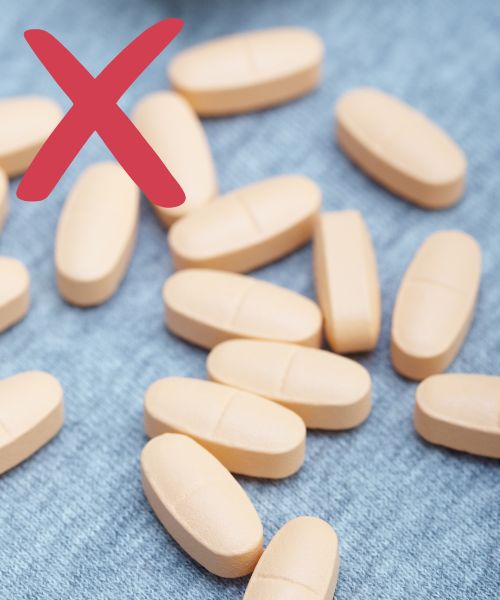
Antibiotics like tetracyclines that include doxycycline, minocycline, and tigecycline can interact with Accutane and lead to severe issues like pseudotumor cerebri (PTC), which is a syndrome of intracranial hypertension characterized by headaches and visual disturbances that can lead to blindness if taken for a long time.
Therefore, if you’re currently taking Accutane prescribed by your dermatologist and another doctor prescribes antibiotics, it’s best to immediately tell them that you’re on this medication and look for alternative treatments.
That said, not all antibiotics interact with Accutane; however, it’s always best to play it safe and double-check with your prescribing doctor if you’re on this medication.
Exfoliating
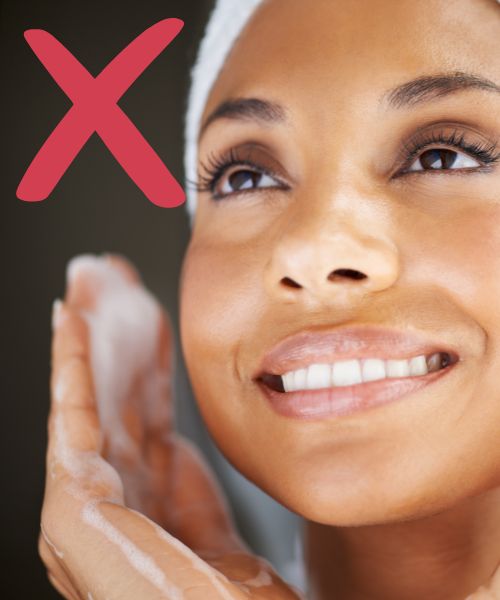
Any type of exfoliation, including chemical that consists of using toners or serums containing alpha hydroxy acids, beta hydroxy acid, and enzymes, as well as manual exfoliating such as scrubs, vigorously rubbing your skin with a towel, dry brushing, or dermaplaning, should be avoided while on Accutane.
This is because Accutane causes the skin to become extremely sensitive; therefore, any exfoliation involving removing those precious dead skin cells that help maintain a healthy barrier on the skin can lead to further irritation and inflammation.
Additionally, for manual exfoliation, vigorous rubbing or brushing can also lead to tearing, which can become infected.
Using Topical Retinoids
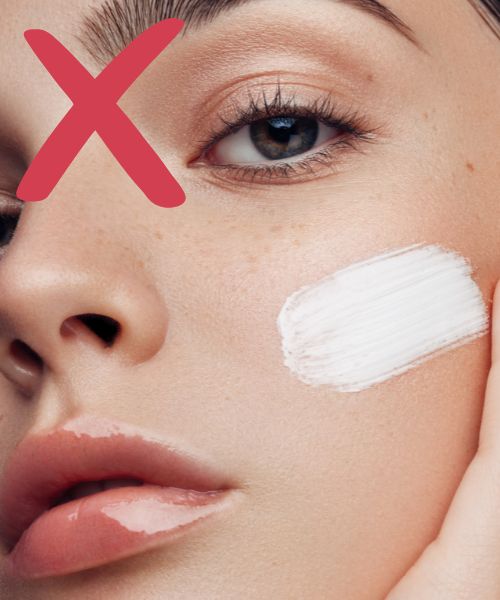
Similar to exfoliation, topical retinoids such as retinol, tretinoin, adapalene, and all other milder derivatives should also be avoided while on Accutane.
This is because topical retinoids are technically forms of vitamin A just as Accutane is and can cause the same side effects, including dryness, redness, irritation, and peeling.
Combine that with the already compromised skin barrier that Accutane causes, and you can experience an even higher degree of sensitivity and discomfort.
Therefore, even if you have been using retinoids before starting Accutane, and you may think your skin is used to them, it’s still best to avoid using any of these products until you have completed the full course of your medication.
Using Hydroquinone
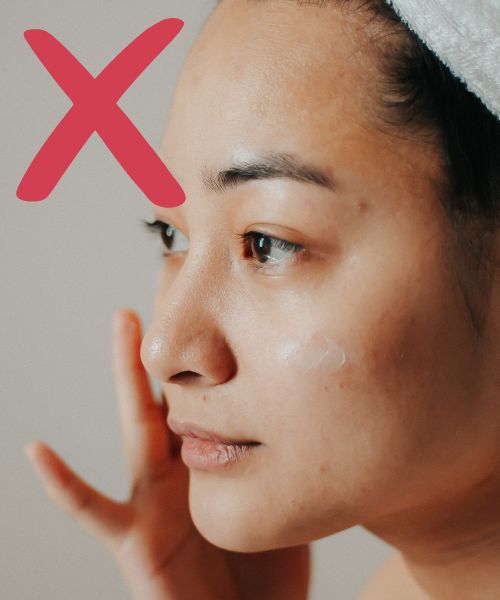
Hydroquinone is a skin-bleaching ingredient found in creams that help lighten dark spots by decreasing the number of melanocytes present.
Melanocytes make melanin, which is the pigment that determines your skin tone. In cases of hyperpigmentation, more melanin is present due to increased melanocyte production.
Therefore, hydroquinone is popular among those trying to lighten dark spots such as post-inflammatory hyperpigmentation left from old acne.
However, as a bleaching agent, hydroquinone isn’t the safest brightening option, and there are many ways it can be harmful to the skin, which is why it’s banned from being used in cosmetics in many European countries.
This ingredient can cause issues like increased sun sensitivity, sunburns, and even complete loss of pigment, leading to permanent white spots, or hypopigmentation, in place of what was a dark spot.
On top of that, hydroquinone can also lead to extreme irritation and redness while on Accutane and is best avoided until you have finished your course.
Even after finishing Accutane, it’s still best to be careful when using any bleaching agent or, better still, opt for a gentler option such as vitamin C, niacinamide, topical retinols, or kojic acid.
Waxing and Laser Hair Removal
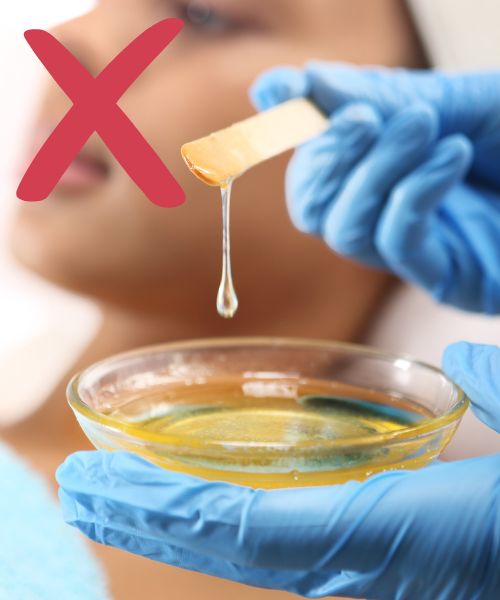
Any hair removal method that pulls the hair out of its follicle, including waxing, laser hair removal, IPL, threading, sugaring, etc., should be strictly avoided while on Accutane.
The reason for this is that again, Accutane can cause your skin to be more sensitive than usual, and therefore, any removal of hair can lead to major irritation and even skin tearing and bleeding.
While on Accutane, it’s best to opt for safer methods such as shaving and using depilatory creams.
Removing hair with these methods can be inconvenient, but it’s the safest option while on Accutane and comes without the risk of damaging your skin and having to deal with longer-lasting side effects like scarring and pigmentation changes.
Treatments for Acne Scars
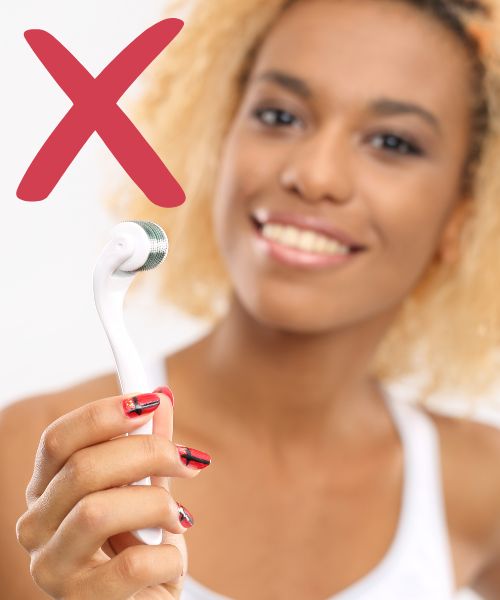
Aggressive treatments for acne scars like chemical peels, microneedling, microdermabrasion, and lasers should also be avoided while on Accutane.
These treatments work by causing damage to the skin in order to stimulate collagen production and cell renewal; therefore, doing this while the skin is already traumatized from the effects of Accutane can lead to unnecessary discomfort and even more damage.
Rather than subjecting your skin to these treatments while still fragile, it’s best to finish your course first and allow your skin to recover from the intense effects for a few months before considering anything that involves pricking the skin with needles or peeling multiple layers of your skin off.

My name is Simone and I am a certified skin specialist. I created this website to teach my readers how to take great care of their skin and I also like to occasionally share my honest opinions on skincare products I’ve tried. You can learn more about me here.
